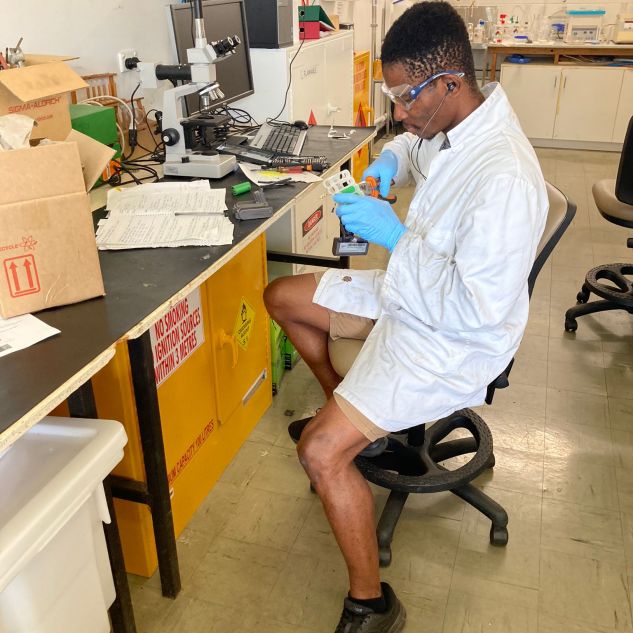
Written By
Tianna Killoran
College
College of Science and Engineering
Publish Date
11 January 2023
Related Study Areas
Charging up for sustainable change
Every year, only about 10 per cent of Australia’s lithium-ion battery waste is recycled. The CSIRO estimates this is a lost value of more than $603 million dollars. But what if we could do something about this waste? JCU PhD Candidate Emenike Okonkwo is researching a better method to recycle batteries that is both environmentally friendly and more cost effective.
Moving from Nigeria to Australia to complete his PhD, Emenike says he came from a background in metallurgy and was immediately interested when he heard about a JCU project to recover materials from spent batteries. “Converting waste into useful material was the research that I did before coming to JCU. So, this research project at JCU aligned with what I’ve done before and I thought it would be great if I could use waste to extract metals from spent batteries,” he says.
Now in the third year of his PhD, Emenike is developing new methods to extract these precious materials and reuse them for other purposes. “It’s not just about making the batteries, but also about what happens when the battery dies? With the current issues surrounding mining of these materials, how can we ensure we have enough materials to produce enough batteries in the future?”
Lithium-ion batteries continue to be used in everything from mobile phones to electric cars. After a life span of about 3-10 years, these batteries become ‘spent’, but they still contain valuable metals such as lithium, manganese, cobalt and nickel.
But battery recycling in Australia is still facing challenges. Emenike says his research is developing both a cost effective and environmentally friendly method for extracting these precious materials from spent lithium-ion batteries. “The idea was to incorporate everyday waste materials into this process for recycling so that we could overall reduce the cost of recycling and have a method that is more eco-friendly,” he says.


Creating wealth from waste
Have you ever given a second thought to the orange rinds or coffee grounds you throw out, or perhaps the waste produced from our agricultural industries? Emenike says he has developed an environmentally friendly and cost effective way of using organic compounds like these to help recycle batteries.
This solves one of the key challenges of battery recycling, which is balancing cost against environmental impact. “There are different perspectives for recycling. One of them is to save the environment, which I think is really important, but the other purpose is also to make money from these materials. Sometimes these two goals can conflict, where it might be much cheaper to use toxic chemicals for recycling the batteries, or on the other hand you can use organic chemicals for recycling, but these can be more expensive.”
Using organic compounds from waste materials — such as sugarcane molasses and spent coffee grounds — is one of the ways Emenike proposes to tackle this challenge. “These organic compounds are biodegradable and will not have a negative effect on the environment. They are also making use of materials we are just throwing away,” he says.
While different methods can be used to extract the metals from the spent batteries, Emenike says he has developed a method that uses waste materials as an alternative to conventional reducing agents. “Reducing agents essentially reduce the oxidation state of the transition metals in the battery, aids their dissolution and improves the overall efficiency of the extraction process,” he says. “Spent coffee grounds, which are often tossed away by cafes, are very effective as reducing agents.”
Similarly, rather than using common acids such as sulphuric acid, phosphoric acid, nitric acid and hydrochloric acid, which are known to harm the environment, Emenike’s research proposes the use of organic acids such as citric acids, ascorbic acid, methanesulfonic acid among others. Some of these acids can even also be found in waste materials, such as citric acid in orange rinds. “These organic acids are biodegradable and less corrosive. Compared to acids such as sulphuric acid, the use of organic acids reduces the chemical and energy requirements in later steps within the recycling process," Emenike says.


Finding a new life for lithium
Emenike’s research into recycling lithium-ion batteries will enable us to continue using and reusing batteries for technology in the future. Some of the recovered metals, such as lithium, can also find a new life in other devices.
"The method I’ve developed through my research is more eco-friendly and cost effective because it reduces the quantity of toxic chemicals in the overall process of recycling lithium-ion batteries."
JCU PhD Candidate, Emenike Okonkwo
While Emenike’s research focuses specifically on lithium-ion batteries, there is the potential for his work to be applied to recovering materials from other types of batteries. “There is a possibility that we can use some of these waste materials and methods to recycle other things in the future,” Emenike says.
“The advantage of focusing on these batteries is that they’re the most widely used battery in Australia,” he says. “Lithium-ion batteries will power our future and likely be around for the next ten to fifteen years.”